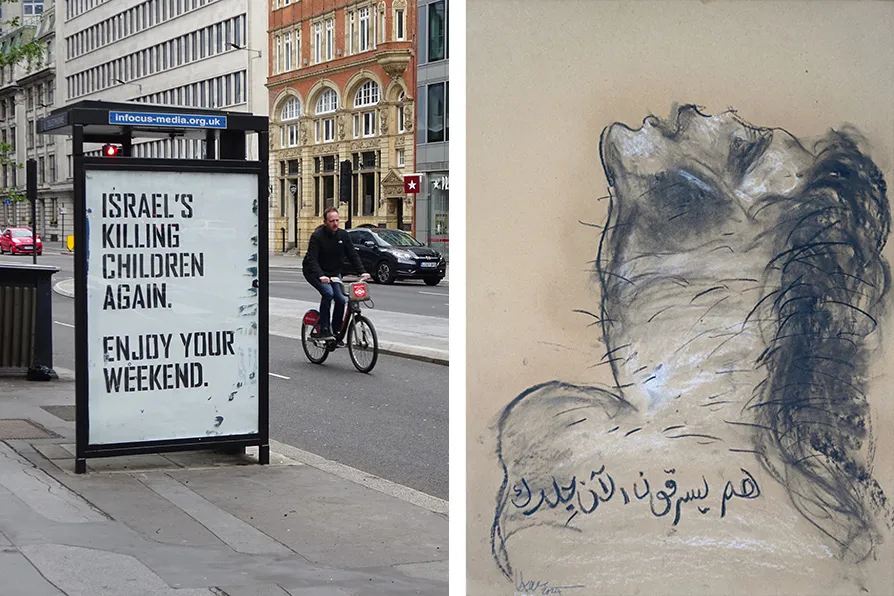DENNIS BROE searches the literary canon to explore why a duplicitous, lying, cheating, conning US businessman is accepted as Scammer-in-Chief
JAN WOOLF applauds the necessarily subversive character of the Palestinian poster in Britain

 (L) Protest Stencil (R) Hazem Harb, They Are Now Stealing Your Skin, 2024 [Pics: Courtesy of P21 Gallery]
(L) Protest Stencil (R) Hazem Harb, They Are Now Stealing Your Skin, 2024 [Pics: Courtesy of P21 Gallery]
Art of the Palestinian poster
P21 Gallery, Camden, London
★★★★★
OFF I go, full of good food, nice night’s sleep, a mac (rain is forecast) and my keffiyeh slung round my neck — not quite virtue signalling, but it’s the least I can do as a north London boomer on a Freedom Pass — to review the latest art exhibition at P21 gallery near London’s King’s Cross.
Art of the Palestinian Poster doesn’t depict hell — that is printed on the retinas of those people who live in Gaza and have, to date, survived. The show depicts resistance. As Susan Sontag writes: “A poster aims to seduce, to exhort, to sell, to educate, to convince, to appeal.” I would add to that list to reveal and encourage. The latter en-cour-age means to send blood to the heart, so that we don’t get too dismayed at how awful it is. Not paralytically dismayed anyway, or where would the energy come from to campaign?
The energy was there to make these posters, right enough. This aesthetically fine set of contemporary Palestinian posters are as good a set of posters as you’d get anywhere, and on any issue. They make you believe that justice for the Palestinian people can happen.
It might seem an indulgence to mention the aesthetic but it isn’t — as the clearer the form the more the subject matter delivers its punch. No pathos in any of them; rather, this is what is happening. We need you to know and act on our behalf please.
Because they are human, they are often witty. Mariam, the “icon” of Madonna and Child with golden halos — a nod to Western Christian art by Bashar Alhroub — is both witty and profound. Hazem Harb’s visceral head-back howl of They Are Now Stealing Your Skin reminds us of a fragment of Guernica.
But let’s not get too art historical — and miss the point. All of these posters, in their variety, simplicity or sophistication grab the attention by any means necessary. We can’t be academic about them as the suffering is so raw and current.
This knowledge (not theory) has always been essential in the history of the poster in revolutionary movements. Campaigning, edifying and, in many cases, beautiful, they carry a Gestalt (a seeing-everything-at-once) rather than a story. There’s no narrative drive: you just clock it.
Or click it — as the anonymous activists from “Protest Stencil” did when they hacked London bus shelters with gut-thumping graphics of Palestine, such as: Israel’s Killing Children Again. Enjoy your weekend. They called them “subvertisments.”
This exhibition includes these bus-stop-size graphics on both sets of stairs joining the two floors of the show. They also encourage the idea that human ingenuity and spirit will win out against the apartheid system that has oppressed generations of the Palestinian people. Vera Tamari’s poster Gaza: From The Rubble Soars Life says it all.
Runs until June 14. Vera Tamari will hold a roundtable talk on June 11. For more information see: p21.gallery.









